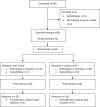Motivational Interviewing to Increase Cognitive Rehabilitation Adherence in Schizophrenia
- PMID: 26420905
- PMCID: PMC4753608
- DOI: 10.1093/schbul/sbv143
Motivational Interviewing to Increase Cognitive Rehabilitation Adherence in Schizophrenia
Abstract
Adherence to treatment in psychiatric populations is notoriously low. In this randomized, controlled, proof-of-concept study, we sought to examine whether motivational interviewing (MI) could be used to enhance motivation for, adherence to, and benefit obtained from cognitive rehabilitation. Dual diagnosis MI, developed specifically for individuals with psychotic symptoms and disorganization, was further adapted to focus on cognitive impairments and their impact. Sixty-four outpatients diagnosed with schizophrenia spectrum disorders completed baseline assessments and were randomized to receive either the 2-session MI focused on cognitive functioning or a 2-session sham control interview focused on assessment and feedback about preferred learning styles. Next, all participants were given 4 weeks during which they could attend up to 10 sessions of a computer-based math training program, which served as a brief analog for a full course of cognitive rehabilitation. As hypothesized, MI condition was associated with greater increases in task-specific motivation along with greater training program session attendance. Moreover, postinterview motivation level predicted session attendance. There were no significant differences in improvement on a measure of cognitive training content, which may have been due to the abbreviated nature of the training. While the literature on the efficacy of MI for individuals with psychosis has been mixed, we speculate that our positive findings may have been influenced by the adaptations made to MI as well as the focus on a nonpharmacological intervention.
Keywords: cognitive remediation; compliance; motivation; psychosis; treatment.
Published by Oxford University Press on behalf of the Maryland Psychiatric Research Center 2015.
Figures
References
-
- Choi KH, Fiszdon JM, Bell MD. Beyond cognition: a longitudinal investigation of the role of motivation during a vocational rehabilitation program. J Nerv Ment Dis. 2013;201:173–178. - PubMed
Publication types
MeSH terms
Grants and funding
LinkOut - more resources
Full Text Sources
Other Literature Sources
Medical
Research Materials




